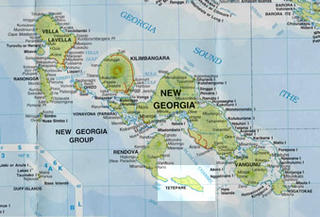Why Tetepare Island Abandoned Two Centuries Ago?
 CDNN, New Zealand
CDNN, New Zealand
_______________
Tetepare Island, (Solomon Islands):
Scientists, historians and community leaders in the Rendova, Roviana and Marovo areas in Solomon Islands' Western Province still cannot explain why Tetepare, the largest uninhabited island in the Pacific, was abandoned nearly 200 years ago.
One recent theory is that the island is close to Kavachi underwater volcano, which erupts in the sea off Tetepare regularly and poisonous gases scared the original inhabitants away.
Their descendents have formed an association to take care of Tetepare in a way that can be maintained over time and contribute to the economy of the surrounding villages.
 This means leaving it in its original state and allowing visitors to visit and see dense vegetation including old trees, exotic palms and tangles of roots of trees untouched for about 200 hundred years.With a micro grant from the European Union they now have an administration and training building for staff and a three-bedroom island lodge to cater for visitors from different parts of the world to see Tetepare's virgin bush, untouched by logging, gardening and other human activity.
This means leaving it in its original state and allowing visitors to visit and see dense vegetation including old trees, exotic palms and tangles of roots of trees untouched for about 200 hundred years.With a micro grant from the European Union they now have an administration and training building for staff and a three-bedroom island lodge to cater for visitors from different parts of the world to see Tetepare's virgin bush, untouched by logging, gardening and other human activity.
It's called eco-tourism and visitors abide by strict environment friendly codes of behavior such as not leaving rubbish around or cutting down trees and plants.Visitors can watch crocodiles, go bush walking, snorkeling, turtle tagging and swimming at rivers and beaches.
Oct 21, 2005
 CDNN, New Zealand
CDNN, New Zealand _______________
Tetepare Island, (Solomon Islands):
Scientists, historians and community leaders in the Rendova, Roviana and Marovo areas in Solomon Islands' Western Province still cannot explain why Tetepare, the largest uninhabited island in the Pacific, was abandoned nearly 200 years ago.
One recent theory is that the island is close to Kavachi underwater volcano, which erupts in the sea off Tetepare regularly and poisonous gases scared the original inhabitants away.
Their descendents have formed an association to take care of Tetepare in a way that can be maintained over time and contribute to the economy of the surrounding villages.
 This means leaving it in its original state and allowing visitors to visit and see dense vegetation including old trees, exotic palms and tangles of roots of trees untouched for about 200 hundred years.With a micro grant from the European Union they now have an administration and training building for staff and a three-bedroom island lodge to cater for visitors from different parts of the world to see Tetepare's virgin bush, untouched by logging, gardening and other human activity.
This means leaving it in its original state and allowing visitors to visit and see dense vegetation including old trees, exotic palms and tangles of roots of trees untouched for about 200 hundred years.With a micro grant from the European Union they now have an administration and training building for staff and a three-bedroom island lodge to cater for visitors from different parts of the world to see Tetepare's virgin bush, untouched by logging, gardening and other human activity.It's called eco-tourism and visitors abide by strict environment friendly codes of behavior such as not leaving rubbish around or cutting down trees and plants.Visitors can watch crocodiles, go bush walking, snorkeling, turtle tagging and swimming at rivers and beaches.
Oct 21, 2005